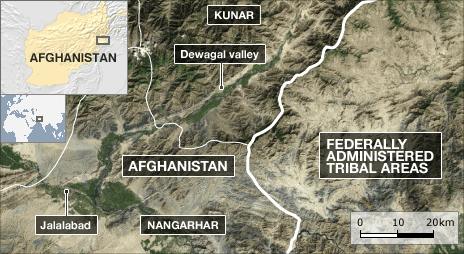UK aid worker may have been killed by rescuers' grenade
- Published
David Cameron: "Linda may not have died at the hands of her captors, as originally believed"
British aid worker Linda Norgrove may have been accidentally killed by US forces during a rescue mission in Afghanistan, David Cameron has said.
International forces originally said she died on Friday when one of her captors detonated a suicide vest.
But the prime minister said new details had come to light suggesting her death may have resulted from a US grenade.
Mr Cameron said he had spoken to her family about the "deeply distressing" news.
Ms Norgrove, 36, who was employed by US aid group DAI, was seized in the Dewagal valley in the Kunar province on 26 September.
Three local staff were kidnapped with her when the two cars they were travelling in were ambushed. The staff were released unharmed last week.
It had been thought that she was killed by her abductors just as US forces reached the compound in which she was being held.
But Mr Cameron said Gen David Petraeus, the top allied commander in Afghanistan, had telephoned him on Monday morning to say she could have died as a result of a grenade detonated by the taskforce during the assault.

Linda Norgrove was seized in the province of Kunar on 26 September
He said the general had told him US forces were deeply dismayed at the outcome.
And he added that it was "deeply regrettable" that information published on Saturday about Ms Norgrove was highly likely to have been incorrect.
The BBC's diplomatic correspondent Nicholas Witchell in Kabul said British officials there were " utterly dismayed and dumbfounded".
He said the situation affected the credibility of the Americans and added: "They say the Americans were so certain on Saturday so why has it taken them 48 hours to revise their position?"
Speaking from the Isle of Lewis, Ms Norgrove's father John said: "We are not saying anything to the press at the moment. We might issue a statement in another day or two, we're not certain, but now we are not saying anything."
'In grave danger'
At a Downing Street press conference, Mr Cameron said 12 meetings of the government emergencies committee, Cobra, had taken place before Foreign Secretary William Hague and the US agreed the rescue attempt should go ahead. This decision was then approved by the prime minister.
He said: "The decision to launch this rescue operation was not an easy one. But I am clear that Linda's life was in grave danger from the moment she was taken.
"Those on the ground and in London feared that she was going to be passed up the terrorist chain which would increase further the already high risk that she would be killed."
Mr Cameron said a full US/UK investigation - which would last several days - was being launched.
It will be led by Maj Gen Joseph L Votel, the chief of staff at US Special Operations Command and the results are expected to be made public.
"We must get to the bottom of what happened and make sure first of all that the family get this information and they know exactly how their wonderful daughter died," Mr Cameron said.
"I will obviously go over in my own mind a hundred times as to whether it was the right decision but I profoundly believe it was given the advice and the information and everything we knew about Linda's dreadful situation having been taken hostage."
US military sources later told the BBC that surveillance footage taken from different angles shows "conflicting evidence" about what killed Ms Norgrove.
They said the investigation may find she was killed by a US grenade, an Afghan suicide vest, or both.
They also identified those holding her as Kumar Taliban. Six of them were killed, none were detained and none escaped, they said. Sources also said there had been no casualties among the Special Forces team that tried to save Ms Norgrove.
Speaking later in the House of Commons, Mr Hague said every indication over the weekend had suggested an explosion caused by her captors had killed the aid worker.
He added that her captors had been assessed to be representatives of a local Salafist group allied to the local Kunar Taliban, who had links higher up the Taliban chain of command to al-Qaeda and to other insurgent groups operating in the the Pakistan and Afghanistan border.
He added: "On the basis of the information available to us we had no doubt whatsoever that there was a continual and real threat to her life and no credible option for a negotiated release.
"Her colleagues were released on 2 October but at no stage was there any serious attempt made by those holding her."
US officials also told the BBC no ransom demands had been received from the kidnappers.
The BBC's Bilal Sarwary in Kabul said tribal elders negotiating her release they had asked Nato not to intervene, to ensure they had more time to secure a release.
An officer working for the National Directorate of Security, Afghanistan's spy agency, said a delegation of mullahs, tribal elders and village chiefs was despatched to the area soon after her capture to negotiate with the militants.
But the coalition forces bombed several nearby locations, forcing the delegation to halt their mission, our correspondent said.
Meanwhile, a senior US source in Kabul told the BBC that Ms Norgrove's abductors were believed to be members of the Taliban and linked to the Quetta Shura - the Taliban leadership council believed to be based in Pakistan.
It is usual practice for US Special Forces to take fragmentation grenades on hostage rescue operations, the source added.
Col Richard Kemp, a former commander of British troops in Afghanistan, said the team who tried to rescue Ms Norgrove faced "immense dangers" and he was not surprised they had been armed with fragmentation grenades.
The prime minister is set to discuss the death of Ms Norgrove with Gen Petraeus during a pre-scheduled meeting in London on Thursday.

Linda Norgrove was kidnapped in the Kunar province in Afghanistan in September
- Published11 October 2010
- Published11 October 2010
- Published17 October 2010
- Published9 October 2010
- Published10 October 2010